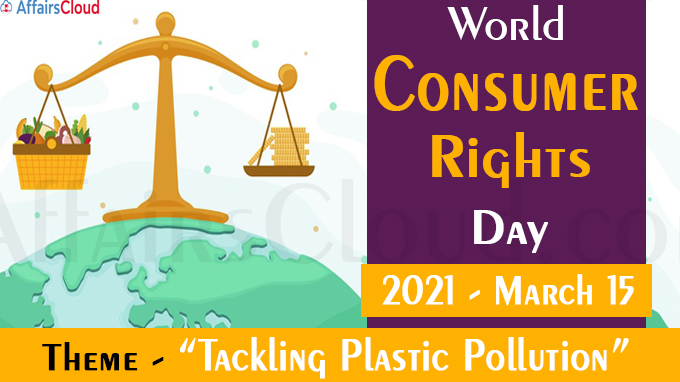
World Consumer Rights Day is annually celebrated across the globe on 15th March to highlight the power of consumers and their rights for a fair, safe and sustainable marketplace for everyone.
The world Consumer Rights day is coordinated by Consumers International, the membership organisation for consumer groups across the globe.
The theme of World Consumer Rights Day 2021 is “Tackling Plastic Pollution”.
Scope of the theme:
i.The campaign under “tackling plastic pollution” will create awareness and encourage consumers across the globe to adopt and promote sustainable practices.
ii.Based on the previous theme of 2020 – “The Sustainable Consumer”, the 2021 campaign will focus on the role of consumer advocates, governments and business in tackling global plastic pollution.
Background:
i.The Idea of the World Consumer Rights day was inspired by former President of the United States of America, John F Kennedy, who addressed the issues of consumer rights in his message to US Congress on 15th March 1962.
ii.In 1983, the Consumer International portal decided to proclaim the 15th March as World Consumer Rights Day.
Key Points:
i.A study in 2019 found that around 82% of respondents are aware of plastic waste and practical actions are taken to tackle plastic pollution.
ii.A 7 Rs model of waste management (replace, rethink, refuse, reduce, reuse, recycle, and repair) has been created to showcase various ways to combat plastic pollution.
iii.The Pew Charitable Trusts and SYSTEMIQ report, “Breaking the Plastic Wave: A Comprehensive Assessment of Pathways Towards Stopping Ocean Plastic Pollution”, released in August 2020, shows that the plastic inflow into oceans is estimated to triple by 2040 and immediate actions will help in storing it by 80%.
Consumer Rights In India:
The parliament of India passed the consumer protection act on 9th December 1986, to empower the consumers.
The rights provided to the consumers are,
- Right to be heard at an appropriate forum.
- Right to seek redressal in case of unfair trade practices.
- Right to consumer education.
- Right to goods and services at competitive prices.
- Right to be informed about the quality, potency, purity, standard and price of goods and services.
- Right to be protected against wrong marketing of goods and services which are hazardous to life and property.




